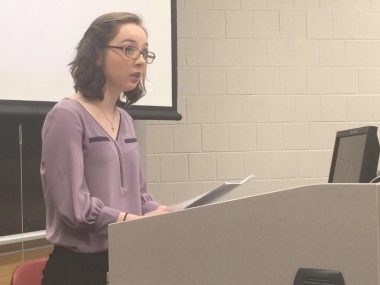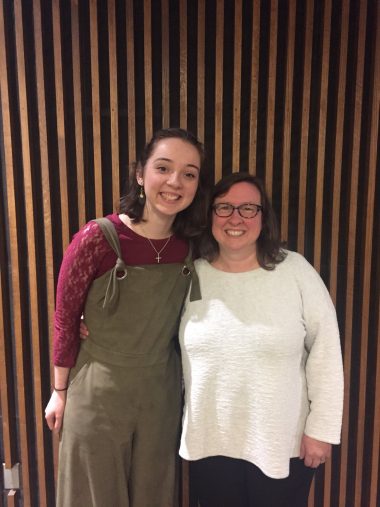The senior Religious Studies major analyzed the work of a national interfaith organization, Interfaith Worker Justice.
Name: Kristina Meyer
Major: Religious Studies
Minor: Mathematics
Faculty mentor: Rebecca Todd Peters, Professor of Religious Studies
Title of research project: Is Faith-Based Community Organizing Still Relevant? How Cultural Shifts are Changing the Conversation

Research abstract:
Throughout the history of the United States, Christian leaders have played a major role in progressive social justice movements. Over the last 50 years, the demographic landscape of the United States has shifted away from white Christian hegemony towards diversity and religious pluralism.
In this context, faith-based social justice organizations must reevaluate their mission and structures to engage more effectively in a new socio-political context. The presenting question is how the structures of interfaith organizations can function to bring people together across lines of religious difference for social transformation and the common good.
For this project, I conducted participant-observation research and interviews with Interfaith Worker Justice (IWJ), a national interfaith organization. The data was collected from three affiliates and included 54 interviews with board members, staff, and volunteers at the national and local levels.
My attention to the effectiveness of the practical work being done by IWJ is grounded in Reinhold Niebuhr’s focus on pragmatic justice as the most appropriate means to approach structural equality and equity in social relationships. My analysis and conclusions build on Rebecca Todd Peters’ ethic of mutual solidarity and Mary Belenky’s theory of constructed knowing to argue that the relationships between faith communities and minoritized individuals should exist in such ways that recognize and integrate the unique strengths of both groups.
I argue that faith communities are indeed still important to organizing and then describe certain shifts that should occur and pitfalls to avoid in order to be more effective in adapting to contemporary contexts.
In other words:
In my analysis of Interfaith Worker Justice (IWJ), I identified five significant modern contextual factors that impact not only IWJ but also the broader landscape of faith-based community organizing (FBCO) in the early 21st-century. I argue that faith communities do have an essential role to play in the public sphere and that FBCO needs to continue developing new models for mobilizing faith voices in ways that respond to new political, social, and ecclesial contextual factors.
What made this topic interesting to you? How did you get started on your research?
I originally wanted to look at how Christians can advocate against Islamophobia because I’m a Christian and I’ve seen the ways that Islamophobia has impacted my Muslim friends. My research developed a long way from that initial question, but I think the core remains the same: how people of faith can advocate for a better society.
What was the most exciting part of the research process for you?
The most exciting part of this research for me was being able to create a paper for the Board of Directors and discussing it over a virtual meeting with them. My research was so clearly relevant and important in a real-life context, outside of academia.

My research mentor helped shape the experience in many ways. She guided me as I developed the research from my original interest to a relevant and feasible project. Dr. Peters helped to foster valuable contacts for me in the field, including the founder of the organization that I researched as well as a Board member who was invested in the work that I was doing. Also, and significantly, she supported me personally, making sure that I was doing all that was needed to take care of my own mental health throughout the extensive and strenuous research process.
How do you think your research might shape you or your career after graduation?
It was through my fieldwork, listening to people stories about their faith, that I realized that I wanted to become a chaplain. I think that supporting people’s spirituality and supporting social justice go hand-in-hand and my research gives me the foundation for such an approach to chaplaincy.
Where can we learn more about your research?
For my senior seminar, I created a website portfolio of my various analyses, including the papers and presentations I’ve done: https://kjmseniorsem.wordpress.com.


